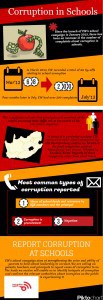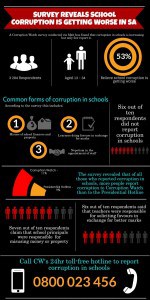Let’s fight corruption in schools
As bells ring and classes kick off for the 2013 academic year, Corruption Watch begins its monitoring of schools – a big focus for the organisation this year. Since launching we’ve received more than 60 reports of possible corruption in schools, mostly involving the embezzlement of funds by principals and administrators, corruption in procurement processes and maladministration by school governing bodies.
In this, the first of a two-part article, we highlight situations in schools in Limpopo, Mpumalanga, Gauteng and KwaZulu-Natal. Next week we’ll bring you updates from Northern Cape, Free State, North West and Eastern Cape. Where possible, we’ve used cases reported directly to Corruption Watch.



